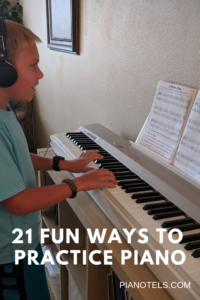Practicing the piano can get a little drab. That’s why you want to change things up a bit to get some good, fun, practice. This is a list to help you approach your practices a little differently.

21 Fun Ways to Practice Piano
- Practice your song to a backtrack. Don’t have a backtrack? Make up your own! Or use a keyboard’s beats to play to.
- Play each line (or musical phrase) of the song in random order.
- Try not to look at your hands while you play. Now try not to look at the music while you play!
- Play the hardest part of your song first, then play the next hardest part, all the way down to playing the easiest part last.
- Start somewhere different each time you play the song.
- Come up with a variation to the song you are practicing.
- Play it SLOWLY.
- Record your song and listen to it. Critique yourself!
- Find a problem in the song and fix it!
- Practice a hard part 7 times slowly and as perfectly as possible. Why 7 times? Some studies suggest that seven times is when your practice will get put into long term memory. When this happens, it becomes much more natural to play it correctly after that.
- Play all the dynamics very dramatically. You can even add dynamics!
- Make up a story to go with your song and play it like that story.
- Write descriptive words in your music and make it sound like that. Use words like: grand, calming, bouncy, peaceful, perky, dancing, menacing, romantic, soothing, mournful, relaxing.
- Make up words to the song and sing along.
- Play it all legato. Without using the pedal, try and make it all sound as if you were playing the pedal!
- Play it all staccato.
- Play the song in your head. Close your eyes and see if you can read the music in your head. If you can’t, try and see how much of the song you can work on to get it so you can read the music in your head.
- Imagine playing your piece in front of thousands of people. Or imagine playing the song in a different location, such as on top of the Grand Canyon, or in a forest, or in Grand Carnegie Hall.
- Play the song super loud — emphasizing each and every note. Playing in this way can help you to solidify the song in your head as well as strengthen your fingers.
- Listen to yourself as if you were a judge in a piano competition. What would you as the judge tell yourself about your performance?
- Play your song in front of someone else. Practicing in front of others really helps you to see where and what you need to work on. It is also great for preparing for performances when you practice in front of others. Make sure to get feedback from them, too!
Click here for a free copy of these ideas in a handout:
Practicing the piano is the #1 single most deciding factor about just how talented you will become as a pianist. Therefore, you will want to make sure that you are practicing the piano effectively.
These ideas can help you to do just that. As you practice in a variety of methods, you will know the music better than ever because you are practicing it in different ways and in different aspects. All of this variety will help to keep the musical concepts fresh and help you perfect your piece.
When you first practice your song, do your best to make sure you are playing it as perfectly as possible that first time through. Your brain is wired to use that first time as the time that will affect you the most. So if you mess up that first time around, it becomes that much harder to fix that mistake the next time you play it.
You can “unlearn” your mistake, but better not to make that mistake in the first place. Therefore, try and get it 100% right from the very first.
How to use this to help motivate your child to practice
If you are wanting to motivate your child to practice more, this list can help you do that. Next time you child sits at the piano, have them decide 3 items from the list that they will use to practice this time.
As you give your child a variety of ways to practice, he/she will not get as bored in their practicing. Not only that, they will come to know their music more thoroughly than they had before! Using a variety of ways to approach a song will help them in developing their piano skills.
The problem with playing the same song over and over again without adding some variety is that he/she will end up learning some parts better than others. Some parts of the song will always be neglected and will never improve because your child isn’t finding that problem and fixing it.
As much as your child can listen to himself/herself as he/she practices the better! Listening to yourself is a skill that really helps pianists in developing their talent. A lot of piano is self-taught because they spend so much time on their own practicing and they must hear their mistakes and learn how to fix them in order to keep progressing.
Charting your practice progress
Something that becomes very helpful in motivating, in keeping communication with your teacher, and in self-evaluation and monitoring, is to keep a piano practice journal. If you write down what was done in your practice, and when you practiced, you will be surprised to find how helpful that can become.
Just the process of writing down a piano practice can help solidify those practice sessions more fully. It seems silly, but your brain will log that information away yet one more time and the next time you practice, your brain can access that information more easily.
Writing it down will also help you to track your progress. Seeing what you have worked on and where you have become will become easier as you track your progress. This is not only motivating, it is educational! You will see patterns of behavior that will help you to determine what is best to continue to work on in the future.
Related Questions:
How do I motivate my child to practice piano? Check out my article about 31 real ways to motivate your child in piano. In that article, I discuss some simple, yet do-able ways to help your child keep their interest in piano.
How long should my child be practicing? Head on over to my article on how long your child should be practicing piano to see if your child is within the general guidelines of the average piano practicer.
Tel loves her life as a piano player, a piano teacher, and a mom. Amid piano blogging, piano teaching, and piano playing, she loves a chance to fit in a good exercise class, volunteer at her kids’ school and at her church, and go on long dates with her husband. Full bio at About Tel.


